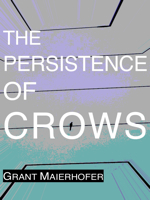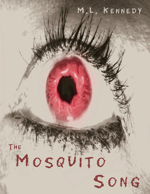
At a small table beneath an open window, two women sat talking and drinking from tall cans, filling an ashtray. A quiet neighborhood, everyone watching late night t.v. or in bed with a book or a lover, the only sound the drone of crickets, like a radio turned low to play all night long.
Tired? Gina asked. You want for me to go home?
Helen shook her head, then lifted her arms and ran her fingers through her hair. She crooned: sum-mer-time an’ the liv’n ain’t eeeeee-zzzz.
IS easy, Gina said, not ain’t.
But it ain’t, Helen said.
Gina shrugged.
We oughta go somewhere, get something to eat, Helen said. Go splash your face. I’ll get you something else to wear.
Gina stood, knocking against the table, nearly upsetting a water-glass stuffed with some nearly full-blown white roses. One of the blossoms shattered, and as Helen watched, another, and another. Sub-audible, she thought, the petals hitting the table.
* * * * *
After her husband had scrunched down in the tub, fully dressed, still wearing his shoes, and slit his own throat, Helen had moved. In the doorway of this bathroom, she held out a blouse dotted with blue cornflowers. Try this, she said.
Gina had removed her shirt, torn at the top of one sleeve, washed her face and neck. She finished patting herself dry, then turned and held the towel to her breast.
What the hell, Helen said. You told me he didn’t hit you.
He didn’t, Gina said. He only shakes me.
But your arms are a mess, Helen said. I’ll get you something long-sleeved.
It’s okay, Gina said, reaching for the blouse. Besides, this is pretty.
* * * * *
The coffee shop at the nearby motel was dark, but the bar was open. The women settled on stools, facing a display of bottles and their own reflections in the large mirror. The bartender straightened up from where he was hunched over, talking to his only customer at the other end of the bar.
Helen ordered a couple of vodka collinses and pushed a basket of pretzels toward her friend. Here, she said.
Gina ate a pretzel, and before the drinks came she had a couple more.
Didn’t know it was so late, Helen said. One drink then we’ll go find something to eat.
Any more cigarettes? Gina asked.
Helen handed her the pack, first taking one for herself. She lit them both, then took out her sunglasses and put them on. I wish I had one of those fancy cigarette holders, she said, staring at herself.
Gina also took out her sunglasses and put them on.
Why do you take it? Helen asked her friend’s reflection in the mirror.
I figured you of all people might understand, Gina answered.
Helen sighed. You’re a fool, she said. Kirk never hit me, never gave me bruises.
Helen’s Kirk had been a medic. His nightmares were never violent, but he did have them. After a while he gave up sleeping. Instead, he taught himself to whittle, trying for the skill of a couple of his elderly cousins. They were so good they made chains, long strands of connected links from only one piece of wood. All night he whittled.
Jimmy doesn’t have nightmares very often, Gina said, and all he ever does is grab my arms and shake. He thinks he’s back driving, IED’s lining the road, and him gripping the wheel. Shaking and shaking.
He’s certifiable, Helen said, they all are. That’s what the war did, what it took from them, what it took from me and you. I bet he quit taking his meds.
He doesn’t like them, Gina answered. Says they don’t help at all.
Yeah, that’s what Kirk thought, too, Helen said.
The bar stayed as empty as when they came in, only the bartender talking to the man at the far end. Just before closing Helen ordered two more drinks and a six-pack to go. Both women, eyes hidden behind sunglasses, leaned against the bar’s padded cushion and stared at themselves in the mirror behind the row of liquor bottles.
Doesn’t this place ever close? Gina asked.
Helen looked down to where the bartender was still talking to the man at the other end. He doesn’t seem to be in any hurry to kick us out, she said. Here, have a beer. She pushed the six-pack toward Gina.
* * * * *
Helen tripped on the last step and Gina slipped an arm under her elbow and lifted. The two women leaned into each other as though into a strong wind. Helen fumbled with her keys. Inside, she turned on a small lamp. How ‘bout some music, she said. You ‘member how to work that old turntable?
Yeah, Gina said, slumping into a chair. Whaddya want?
Anything, Helen answered from the kitchen, as she put the two remaining beers in the refrigerator.
Gina slid to the floor, crawled over and put on the first record she laid her hands on. The music started with a muted trumpet accompanied by a lazy, one-handed piano.
Helen came to the doorway. It’s been a long time since I heard that.
It wasn’t put away, Gina said, as a legendary chanteuse began the lyrics of an old fashioned ballad. The phrasing hesitant, and her voice no longer pure.
Hands on hips, Helen crossed the room clumsily. Gina stood and held open her arms.
Holding each other lightly, the women danced, turning in slow, awkward circles. While they danced a greyish, pre-dawn light came through the open windows. In the eaves some small birds began to sing. When the song ended, resting in the empty groove before the next one, Helen put her head on Gina’s shoulder and, without saying a word, began to cry.
Gina held her friend tighter. She knew that if she were drowning, Helen would swim down to rescue her, would press her mouth to hers, and open it to share what meager air she had, even if it meant she could not save herself.








